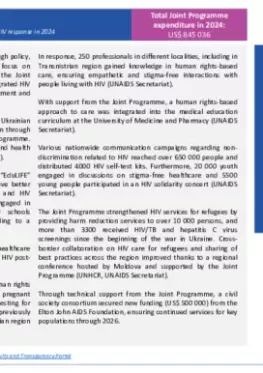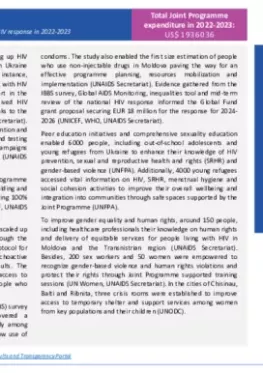|
Republic of Moldova
In 2024, Moldova strengthened its HIV response through policy, education and service integration, with particular focus on supporting vulnerable populations. In Transnistria, the Joint Programme led the development of a costed and integrated HIV and hepatitis programme, optimizing prevention, treatment and care (UNAIDS Secretariat).
Over 4000 vulnerable youth - 2100 of which were Ukrainian refugees - received comprehensive sexuality education through different initiatives and with support from the Joint Programme. Moreover, over 3500 young refugees received HIV and health services through a mobile gynaecological clinic (UNFPA).
Through the development and implementation of the “EduLIFE” school model, over 800 students and 150 parents have better capacities to access sexually transmitted infection and HIV services. In addition, more than 700 specialists engaged in discussions on health education and over 160 schools implemented menstrual hygiene programmes, leading to a reduction in absenteeism among girls (UNFPA).
The Joint Programme trained more than 180 healthcare providers in clinical management of rape, including on HIV post-exposure prophylaxis (UNFPA).
Community-led HIV monitoring revealed systemic human rights violations, including segregation of HIV-positive pregnant women, breaches of confidentiality, mandatory HIV testing for employment and widespread stigma. In addition, previously adopted policies on HIV and health rights in Transnistrian region remained largely unenforced.
In response, 250 professionals in different localities, including in Transnistrian region gained knowledge in human rights-based care, ensuring empathetic and stigma-free interactions with people living with HIV (UNAIDS Secretariat).
With support from the Joint Programme, a human rights-based approach to care was integrated into the medical education curriculum at the University of Medicine and Pharmacy (UNAIDS Secretariat).
Various nationwide communication campaigns regarding non-discrimination related to HIV reached over 650 000 people and distributed 4000 HIV self-test kits. Furthermore, 20 000 youth engaged in discussions on stigma-free healthcare and 5500 young people participated in an HIV solidarity concert (UNAIDS Secretariat).
The Joint Programme strengthened HIV services for refugees by providing harm reduction services to over 10 000 persons, and more than 3300 received HIV/TB and hepatitis C virus screenings since the beginning of the war in Ukraine. Cross-border collaboration on HIV care for refugees and sharing of best practices across the region improved thanks to a regional conference hosted by Moldova and supported by the Joint Programme (UNHCR, UNAIDS Secretariat).
Through technical support from the Joint Programme, a civil society consortium secured new funding (US$ 500 000) from the Elton John AIDS Foundation, ensuring continued services for key populations through 2026.






